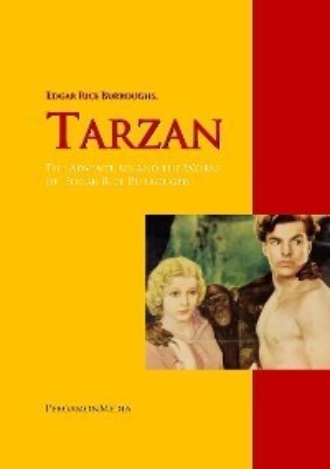
Полная версия
Tarzan: The Adventures and the Works of Edgar Rice Burroughs
Bertha Kircher was no coward, whatever else she may have been, but as night began to close down around her she could not shut out from her mind entirely contemplation of the terrors of the long hours ahead before the rising sun should dissipate the Stygian gloom—the horrid jungle night—that lures forth all the prowling, preying creatures of destruction.
She found, just before dark, an open meadow-like break in the almost interminable bush. There was a small clump of trees near the center and here she decided to camp. The grass was high and thick, affording feed for her horse and a bed for herself, and there was more than enough dead wood lying about the trees to furnish a good fire well through the night. Removing the saddle and bridle from her mount she placed them at the foot of a tree and then picketed the animal close by. Then she busied herself collecting firewood and by the time darkness had fallen she had a good fire and enough wood to last until morning.
From her saddlebags she took cold food and from her canteen a swallow of water. She could not afford more than a small swallow for she could not know how long a time it might be before she should find more. It filled her with sorrow that her poor horse must go waterless, for even German spies may have hearts and this one was very young and very feminine.
It was now dark. There was neither moon nor stars and the light from her fire only accentuated the blackness beyond. She could see the grass about her and the boles of the trees which stood out in brilliant relief against the solid background of impenetrable night, and beyond the firelight there was nothing.
The jungle seemed ominously quiet. Far away in the distance she heard faintly the boom of big guns; but she could not locate their direction. She strained her ears until her nerves were on the point of breaking; but she could not tell from whence the sound came. And it meant so much to her to know, for the battle-lines were north of her and if she could but locate the direction of the firing she would know which way to go in the morning.
In the morning! Would she live to see another morning? She squared her shoulders and shook herself together. Such thoughts must be banished—they would never do. Bravely she hummed an air as she arranged her saddle near the fire and pulled a quantity of long grass to make a comfortable seat over which she spread her saddle blanket. Then she un-strapped a heavy, military coat from the cantle of her saddle and donned it, for the air was already chill.
Seating herself where she could lean against the saddle she prepared to maintain a sleepless vigil throughout the night. For an hour the silence was broken only by the distant booming of the guns and the low noises of the feeding horse and then, from possibly a mile away, came the rumbling thunder of a lion's roar. The girl started and laid her hand upon the rifle at her side. A little shudder ran through her slight frame and she could feel the goose flesh rise upon her body.
Again and again was the awful sound repeated and each time she was certain that it came nearer. She could locate the direction of this sound although she could not that of the guns, for the origin of the former was much closer. The lion was up wind and so could not have caught her scent as yet, though he might be approaching to investigate the light of the fire which could doubtless be seen for a considerable distance.
For another fear-filled hour the girl sat straining her eyes and ears out into the black void beyond her little island of light. During all that time the lion did not roar again; but there was constantly the sensation that it was creeping upon her. Again and again she would start and turn to peer into the blackness beyond the trees behind her as her overwrought nerves conjured the stealthy fall of padded feet. She held the rifle across her knees at the ready now and she was trembling from head to foot.
Suddenly her horse raised his head and snorted, and with a little cry of terror the girl sprang to her feet. The animal turned and trotted back toward her until the picket rope brought him to a stand, and then he wheeled about and with ears up-pricked gazed out into the night; but the girl could neither see nor hear aught.
Still another hour of terror passed during which the horse often raised his head to peer long and searchingly into the dark. The girl replenished the fire from time to time. She found herself becoming very sleepy. Her heavy lids persisted in drooping; but she dared not sleep. Fearful lest she might be overcome by the drowsiness that was stealing through her she rose and walked briskly to and fro, then she threw some more wood on the fire, walked over and stroked her horse's muzzle and returned to her seat.
Leaning against the saddle she tried to occupy her mind with plans for the morrow; but she must have dozed. With a start she awoke. It was broad daylight. The hideous night with its indescribable terrors was gone.
She could scarce believe the testimony of her senses. She had slept for hours, the fire was out and yet she and the horse were safe and alive, nor was there sign of savage beast about. And, best of all, the sun was shining, pointing the straight road to the east. Hastily she ate a few mouthfuls of her precious rations, which with a swallow of water constituted her breakfast. Then she saddled her horse and mounted. Already she felt that she was as good as safe in Wilhelmstal.
Possibly, however, she might have revised her conclusions could she have seen the two pairs of eyes watching her every move intently from different points in the bush.
Light-hearted and unsuspecting, the girl rode across the clearing toward the bush while directly before her two yellow-green eyes glared round and terrible, a tawny tail twitched nervously and great, padded paws gathered beneath a sleek barrel for a mighty spring. The horse was almost at the edge of the bush when Numa, the lion, launched himself through the air. He struck the animal's right shoulder at the instant that it reared, terrified, to wheel in flight. The force of the impact hurled the horse backward to the ground and so quickly that the girl had no opportunity to extricate herself; but fell to the earth with her mount, her left leg pinned beneath its body.
Horror-stricken, she saw the king of beasts open his mighty jaws and seize the screaming creature by the back of its neck. The great jaws closed, there was an instant's struggle as Numa shook his prey. She could hear the vertebrae crack as the mighty fangs crunched through them, and then the muscles of her faithful friend relaxed in death.
Numa crouched upon his kill. His terrifying eyes riveted themselves upon the girl's face—she could feel his hot breath upon her cheek and the odor of the fetid vapor nauseated her. For what seemed an eternity to the girl the two lay staring at each other and then the lion uttered a menacing growl.
Never before had Bertha Kircher been so terrified—never before had she had such cause for terror. At her hip was a pistol—a formidable weapon with which to face a man; but a puny thing indeed with which to menace the great beast before her. She knew that at best it could but enrage him and yet she meant to sell her life dearly, for she felt that she must die. No human succor could have availed her even had it been there to offer itself. For a moment she tore her gaze from the hypnotic fascination of that awful face and breathed a last prayer to her God. She did not ask for aid, for she felt that she was beyond even divine succor—she only asked that the end might come quickly and with as little pain as possible.
No one can prophesy what a lion will do in any given emergency. This one glared and growled at the girl for a moment and then fell to feeding upon the dead horse. Fräulein Kircher wondered for an instant and then attempted to draw her leg cautiously from beneath the body of her mount; but she could not budge it. She increased the force of her efforts and Numa looked up from his feeding to growl again. The girl desisted. She hoped that he might satisfy his hunger and then depart to lie up, but she could not believe that he would leave her there alive. Doubtless he would drag the remains of his kill into the bush for hiding and, as there could be no doubt that he considered her part of his prey, he would certainly come back for her, or possibly drag her in first and kill her.
Again Numa fell to feeding. The girl's nerves were at the breaking point. She wondered that she had not fainted under the strain of terror and shock. She recalled that she often had wished she might see a lion, close to, make a kill and feed upon it. God! how realistically her wish had been granted.
Again she bethought herself of her pistol. As she had fallen, the holster had slipped around so that the weapon now lay beneath her. Very slowly she reached for it; but in so doing she was forced to raise her body from the ground. Instantly the lion was aroused. With the swiftness of a cat he reached across the carcass of the horse and placed a heavy, taloned paw upon her breast, crushing her back to earth, and all the time he growled and snarled horribly. His face was a picture of frightful rage incarnate. For a moment neither moved and then from behind her the girl heard a human voice uttering bestial sounds.
Numa suddenly looked up from the girl's face at the thing beyond her. His growls increased to roars as he drew back, ripping the front of the girl's waist almost from her body with his long talons, exposing her white bosom, which through some miracle of chance the great claws did not touch.
Tarzan of the Apes had witnessed the entire encounter from the moment that Numa had leaped upon his prey. For some time before, he had been watching the girl, and after the lion attacked her he had at first been minded to let Numa have his way with her. What was she but a hated German and a spy besides? He had seen her at General Kraut's headquarters, in conference with the German staff and again he had seen her within the British lines masquerading as a British officer. It was the latter thought that prompted him to interfere. Doubtless General Jan Smuts would be glad to meet and question her. She might be forced to divulge information of value to the British commander before Smuts had her shot.
Tarzan had recognized not only the girl, but the lion as well. All lions may look alike to you and me; but not so to their intimates of the jungle. Each has his individual characteristics of face and form and gait as well defined as those that differentiate members of the human family, and besides these the creatures of the jungle have a still more positive test—that of scent. Each of us, man or beast, has his own peculiar odor, and it is mostly by this that the beasts of the jungle, endowed with miraculous powers of scent, recognize individuals.
It is the final proof. You have seen it demonstrated a thousand times—a dog recognizes your voice and looks at you. He knows your face and figure. Good, there can be no doubt in his mind but that it is you; but is he satisfied? No, sir—he must come up and smell of you. All his other senses may be fallible, but not his sense of smell, and so he makes assurance positive by the final test.
Tarzan recognized Numa as he whom he had muzzled with the hide of Horta, the boar—as he whom he handled by a rope for two days and finally loosed in a German front-line trench, and he knew that Numa would recognize him—that he would remember the sharp spear that had goaded him into submission and obedience and Tarzan hoped that the lesson he had learned still remained with the lion.
Now he came forward calling to Numa in the language of the great apes—warning him away from the girl. It is open to question that Numa, the lion, understood him; but he did understand the menace of the heavy spear that the Tarmangani carried so ready in his brown, right hand, and so he drew back, growling, trying to decide in his little brain whether to charge or flee.
On came the ape-man with never a pause, straight for the lion. "Go away, Numa," he cried, "or Tarzan will tie you up again and lead you through the jungle without food. See Arad, my spear! Do you recall how his point stuck into you and how with his haft I beat you over the head? Go, Numa! I am Tarzan of the Apes!"
Numa wrinkled the skin of his face into great folds, until his eyes almost disappeared and he growled and roared and snarled and growled again, and when the spear point came at last quite close to him he struck at it viciously with his armed paw; but he drew back. Tarzan stepped over the dead horse and the girl lying behind him gazed in wide-eyed astonishment at the handsome figure driving an angry lion deliberately from its kill.
When Numa had retreated a few yards, the ape-man called back to the girl in perfect German, "Are you badly hurt?"
"I think not," she replied; "but I cannot extricate my foot from beneath my horse."
"Try again," commanded Tarzan. "I do not know how long I can hold Numa thus."
The girl struggled frantically; but at last she sank back upon an elbow.
"It is impossible," she called to him.
He backed slowly until he was again beside the horse, when he reached down and grasped the cinch, which was still intact. Then with one hand he raised the carcass from the ground. The girl freed herself and rose to her feet.
"You can walk?" asked Tarzan.
"Yes," she said; "my leg is numb; but it does not seem to be injured."
"Good," commented the ape-man. "Back slowly away behind me—make no sudden movements. I think he will not charge."
With utmost deliberation the two backed toward the bush. Numa stood for a moment, growling, then he followed them, slowly. Tarzan wondered if he would come beyond his kill or if he would stop there. If he followed them beyond, then they could look for a charge, and if Numa charged it was very likely that he would get one of them. When the lion reached the carcass of the horse Tarzan stopped and so did Numa, as Tarzan had thought that he would and the ape-man waited to see what the lion would do next. He eyed them for a moment, snarled angrily and then looked down at the tempting meat. Presently he crouched upon his kill and resumed feeding.
The girl breathed a deep sigh of relief as she and the ape-man resumed their slow retreat with only an occasional glance from the lion, and when at last they reached the bush and had turned and entered it, she felt a sudden giddiness overwhelm her so that she staggered and would have fallen had Tarzan not caught her. It was only a moment before she regained control of herself.
"I could not help it," she said, in half apology. "I was so close to death—such a horrible death—it unnerved me for an instant; but I am all right now. How can I ever thank you? It was so wonderful—you did not seem to fear the frightful creature in the least; yet he was afraid of you. Who are you?"
"He knows me," replied Tarzan, grimly—"that is why he fears me."
He was standing facing the girl now and for the first time he had a chance to look at her squarely and closely. She was very beautiful—that was undeniable; but Tarzan realized her beauty only in a subconscious way. It was superficial—it did not color her soul which must be black as sin. She was German—a German spy. He hated her and desired only to compass her destruction; but he would choose the manner so that it would work most grievously against the enemy cause.
He saw her naked breasts where Numa had torn her clothing from her and dangling there against the soft, white flesh he saw that which brought a sudden scowl of surprise and anger to his face—the diamond-studded, golden locket of his youth—the love token that had been stolen from the breast of his mate by Schneider, the Hun. The girl saw the scowl but did not interpret it correctly. Tarzan grasped her roughly by the arm.
"Where did you get this?" he demanded, as he tore the bauble from her.
The girl drew herself to her full height. "Take your hand from me," she demanded, but the ape-man paid no attention to her words, only seizing her more forcibly.
"Answer me!" he snapped. "Where did you get this?"
"What is it to you?" she countered.
"It is mine," he replied. "Tell me who gave it to you or I will throw you back to Numa."
"You would do that?" she asked.
"Why not?" he queried. "You are a spy and spies must die if they are caught."
"You were going to kill me, then?"
"I was going to take you to headquarters. They would dispose of you there; but Numa can do it quite as effectively. Which do you prefer?"
"Hauptmann Fritz Schneider gave it to me," she said.
"Headquarters it will be then," said Tarzan. "Come!" The girl moved at his side through the bush and all the time her mind worked quickly. They were moving east, which suited her, and as long as they continued to move east she was glad to have the protection of the great, white savage. She speculated much upon the fact that her pistol still swung at her hip. The man must be mad not to take it from her.
"What makes you think I am a spy?" she asked after a long silence.
"I saw you at German headquarters," he replied, "and then again inside the British lines."
She could not let him take her back to them. She must reach Wilhelmstal at once and she was determined to do so even if she must have recourse to her pistol. She cast a side glance at the tall figure. What a magnificent creature! But yet he was a brute who would kill her or have her killed if she did not slay him. And the locket! She must have that back—it must not fail to reach Wilhelmstal. Tarzan was now a foot or two ahead of her as the path was very narrow. Cautiously she drew her pistol. A single shot would suffice and he was so close that she could not miss. As she figured it all out her eyes rested on the brown skin with the graceful muscles rolling beneath it and the perfect limbs and head and the carriage that a proud king of old might have envied. A wave of revulsion for her contemplated act surged through her. No, she could not do it—yet, she must be free and she must regain possession of the locket. And then, almost blindly, she swung the weapon up and struck Tarzan heavily upon the back of the head with its butt. Like a felled ox he dropped in his tracks.
Chapter VI Vengeance and Mercy
It was an hour later that Sheeta, the panther, hunting, chanced to glance upward into the blue sky where his attention was attracted by Ska, the vulture, circling slowly above the bush a mile away and downwind. For a long minute the yellow eyes stared intently at the gruesome bird. They saw Ska dive and rise again to continue his ominous circling and in these movements their woodcraft read that which, while obvious to Sheeta, would doubtless have meant nothing to you or me.
The hunting cat guessed that on the ground beneath Ska was some living thing of flesh—either a beast feeding upon its kill or a dying animal that Ska did not yet dare attack. In either event it might prove meat for Sheeta, and so the wary feline stalked by a circuitous route, upon soft, padded feet that gave forth no sound, until the circling aasvogel and his intended prey were upwind. Then, sniffing each vagrant zephyr, Sheeta, the panther, crept cautiously forward, nor had he advanced any considerable distance before his keen nostrils were rewarded with the scent of man—a Tarmangani.
Sheeta paused. He was not a hunter of men. He was young and in his prime; but always before he had avoided this hated presence. Of late he had become more accustomed to it with the passing of many soldiers through his ancient hunting ground, and as the soldiers had frightened away a great part of the game Sheeta had been wont to feed upon, the days had been lean, and Sheeta was hungry.
The circling Ska suggested that this Tarmangani might be helpless and upon the point of dying, else Ska would not have been interested in him, and so easy prey for Sheeta. With this thought in mind the cat resumed his stalking. Presently he pushed through the thick bush and his yellow-green eyes rested gloatingly upon the body of an almost naked Tarmangani lying face down in a narrow game trail.
Numa, sated, rose from the carcass of Bertha Kircher's horse and seized the partially devoured body by the neck and dragged it into the bush; then he started east toward the lair where he had left his mate. Being uncomfortably full he was inclined to be sleepy and far from belligerent. He moved slowly and majestically with no effort at silence or concealment. The king walked abroad, unafraid.
With an occasional regal glance to right or left he moved along a narrow game trail until at a turn he came to a sudden stop at what lay revealed before him—Sheeta, the panther, creeping stealthily upon the almost naked body of a Tarmangani lying face down in the deep dust of the pathway. Numa glared intently at the quiet body in the dust. Recognition came. It was his Tarmangani. A low growl of warning rumbled from his throat and Sheeta halted with one paw upon Tarzan's back and turned suddenly to eye the intruder.
What passed within those savage brains? Who may say? The panther seemed debating the wisdom of defending his find, for he growled horribly as though warning Numa away from the prey. And Numa? Was the idea of property rights dominating his thoughts? The Tarmangani was his, or he was the Tarmangani's. Had not the Great White Ape mastered and subdued him and, too, had he not fed him? Numa recalled the fear that he had felt of this man-thing and his cruel spear; but in savage brains fear is more likely to engender respect than hatred and so Numa found that he respected the creature who had subdued and mastered him. He saw Sheeta, upon whom he looked with contempt, daring to molest the master of the lion. Jealousy and greed alone might have been sufficient to prompt Numa to drive Sheeta away, even though the lion was not sufficiently hungry to devour the flesh that he thus wrested from the lesser cat; but then, too, there was in the little brain within the massive head a sense of loyalty, and perhaps this it was that sent Numa quickly forward, growling, toward the spitting Sheeta.
For a moment the latter stood his ground with arched back and snarling face, for all the world like a great, spotted tabby.
Numa had not felt like fighting; but the sight of Sheeta daring to dispute his rights kindled his ferocious brain to sudden fire. His rounded eyes glared with rage, his undulating tail snapped to stiff erectness as, with a frightful roar, he charged this presuming vassal.
It came so suddenly and from so short a distance that Sheeta had no chance to turn and flee the rush, and so he met it with raking talons and snapping jaws; but the odds were all against him. To the larger fangs and the more powerful jaws of his adversary were added huge talons and the preponderance of the lion's great weight. At the first clash Sheeta was crushed and, though he deliberately fell upon his back and drew up his powerful hind legs beneath Numa with the intention of disemboweling him, the lion forestalled him and at the same time closed his awful jaws upon Sheeta's throat.
It was soon over. Numa rose, shaking himself, and stood above the torn and mutilated body of his foe. His own sleek coat was cut and the red blood trickled down his flank; though it was but a minor injury, it angered him. He glared down at the dead panther and then, in a fit of rage, he seized and mauled the body only to drop it in a moment, lower his head, voice a single terrific roar, and turn toward the ape-man.
Approaching the still form he sniffed it over from head to foot. Then he placed a huge paw upon it and turned it over with its face up. Again he smelled about the body and at last with his rough tongue licked Tarzan's face. It was then that Tarzan opened his eyes.
Above him towered the huge lion, its hot breath upon his face, its rough tongue upon his cheek. The ape-man had often been close to death; but never before so close as this, he thought, for he was convinced that death was but a matter of seconds. His brain was still numb from the effects of the blow that had felled him, and so he did not, for a moment, recognize the lion that stood over him as the one he had so recently encountered.
Presently, however, recognition dawned upon him and with it a realization of the astounding fact that Numa did not seem bent on devouring him—at least not immediately. His position was a delicate one. The lion stood astraddle Tarzan with his front paws. The ape-man could not rise, therefore, without pushing the lion away and whether Numa would tolerate being pushed was an open question. Too, the beast might consider him already dead and any movement that indicated the contrary was true would, in all likelihood, arouse the killing instinct of the man-eater.






